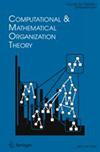Institutional Logics and Functionalist Differentiation Theory: Challenges and pathways forward
IF 1.5
4区 管理学
Q3 COMPUTER SCIENCE, INTERDISCIPLINARY APPLICATIONS
Computational and Mathematical Organization Theory
Pub Date : 2022-07-01
DOI:10.1177/26317877221109276
引用次数: 2
Abstract
As a theoretical framework in organization studies, institutional logics is immensely popular. It has been used in a large amount of highly contributory and enlightening empirical studies, and developed far beyond its original formulation in a classical paper by Friedland and Alford (1991). In our paper, we identify three key theoretical problems that have emerged in the development and use of institutional logics theory in the past three decades: the lack of uniformity and coherence in the definitions and empirical identifications of logics; the tendency of institutional logics theorists to attempt to build grand theory to connect micro, meso, and macro levels of analysis; and the difficulties to explain how institutional logics are reproduced and how institutional logics interrelate and evolve over time. To address these issues, we highlight the similarities between institutional logics theory and classical functionalist differentiation theory, drawing its legacy from Max Weber, Talcott Parsons, and Robert Merton, and propose its use as a resource in further theoretical development. The aim of the paper is not to reject institutional logics theory, or merely to point out its weaknesses, but to demonstrate how a revival of some classics in sociological theory can be used to sharpen institutional logics as an analytical tool and thus assist in efforts to further improve the usefulness of institutional logics as a theoretical framework in organization studies.制度逻辑和功能主义分化理论:挑战与前进路径
制度逻辑作为组织研究的理论框架,受到了广泛的关注。它已被用于大量具有高度贡献和启发性的实证研究中,并且远远超出了弗里德兰和阿尔福德(1991)的经典论文中的原始公式。在本文中,我们指出了过去三十年来在制度逻辑理论的发展和应用中出现的三个关键理论问题:逻辑的定义和经验认同缺乏统一性和连贯性;制度逻辑理论家试图建立宏大的理论来连接微观、中观和宏观层面的分析;以及解释制度逻辑如何再现以及制度逻辑如何相互关联并随时间演变的困难。为了解决这些问题,我们强调制度逻辑理论与经典功能主义分化理论之间的相似之处,从马克斯·韦伯、塔尔科特·帕森斯和罗伯特·默顿那里汲取其遗产,并建议将其作为进一步理论发展的资源。本文的目的不是拒绝制度逻辑理论,或者仅仅是指出它的弱点,而是证明如何利用社会学理论中一些经典的复兴来锐化制度逻辑作为分析工具,从而有助于进一步提高制度逻辑作为组织研究理论框架的实用性。
本文章由计算机程序翻译,如有差异,请以英文原文为准。
求助全文
约1分钟内获得全文
求助全文
来源期刊

Computational and Mathematical Organization Theory
COMPUTER SCIENCE, INTERDISCIPLINARY APPLICATIONS-MATHEMATICS, INTERDISCIPLINARY APPLICATIONS
CiteScore
3.80
自引率
16.70%
发文量
14
审稿时长
>12 weeks
期刊介绍:
Computational and Mathematical Organization Theory provides an international forum for interdisciplinary research that combines computation, organizations and society. The goal is to advance the state of science in formal reasoning, analysis, and system building drawing on and encouraging advances in areas at the confluence of social networks, artificial intelligence, complexity, machine learning, sociology, business, political science, economics, and operations research. The papers in this journal will lead to the development of newtheories that explain and predict the behaviour of complex adaptive systems, new computational models and technologies that are responsible to society, business, policy, and law, new methods for integrating data, computational models, analysis and visualization techniques.
Various types of papers and underlying research are welcome. Papers presenting, validating, or applying models and/or computational techniques, new algorithms, dynamic metrics for networks and complex systems and papers comparing, contrasting and docking computational models are strongly encouraged. Both applied and theoretical work is strongly encouraged. The editors encourage theoretical research on fundamental principles of social behaviour such as coordination, cooperation, evolution, and destabilization. The editors encourage applied research representing actual organizational or policy problems that can be addressed using computational tools. Work related to fundamental concepts, corporate, military or intelligence issues are welcome.
 求助内容:
求助内容: 应助结果提醒方式:
应助结果提醒方式:


